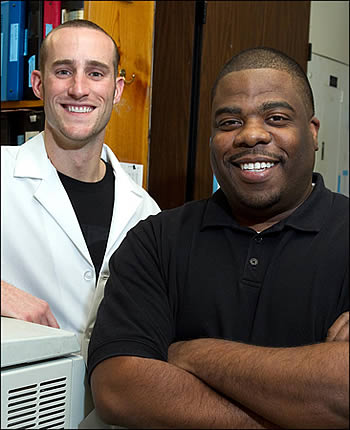Doctoral grads mark end of long journey
Now that he’s finished his doctorate, Ossie Dyson might finally have time to take his wife on a honeymoon.
Classmate William Chappell will be glad to get some rest.
Dyson and Chappell are the two doctoral students who are completing their studies this semester at the Brody School of Medicine and are among the 1,100 graduate students who will receive master’s or doctoral degrees at Friday’s fall commencement exercises in Minges Coliseum. Both will receive doctorates in microbiology and immunology.

William Chappell, left, and Ossie Dyson completed their doctorates in microbiology and immunology this fall at the Brody School of Medicine at ECU. Photo by Cliff Hollis
Doctoral students take courses for the first two years of their studies. After that, they concentrate on research. Altogether, Chappell has spent six years pursuing his doctorate; Dyson has spent five.
The Brody School of Medicine has doctoral programs in six scientific disciplines. Students pay tuition and fees and receive a research stipend for the work they do in the laboratory. Sixty-five students are working on their doctorates at the school.
The path to a Ph.D.
Chappell is from Sunbury, the one-stoplight town in the one-stoplight county of Gates in northeastern North Carolina. The rural setting had plenty of lessons for a young person interested in biology.
“I was always finding dead animals, bugs, stuff like that and picking them up and inspecting them,” Chappell said. Family members warned him of the dangers, but he didn’t stop. “They were like, ‘Aw, you’re gonna catch something.’ It didn’t matter.”
In school, he wasn’t much interested in most subjects. “I was a typical high school student who didn’t want to do anything,” he said. But science caught his attention.
After high school, Chappell attended Elizabeth City State University, graduating with a degree in biology. He chose ECU for his master’s degree, where he got to do some research in labs at the Brody School of Medicine. “Once I got a taste of big-time science,” he said, he knew he wanted to earn his doctorate.
Dyson, on the other hand, had his eyes on medical school. After growing up in Raleigh, he attended ECU, earning a bachelor’s degree in biology and a master’s in cell biology. He was working at the morgue at Pitt County Memorial Hospital, assisting on autopsies with ECU forensic pathologists. Pathology interested him as a medical specialty, and the research portion hooked him.
He decided that if research was what he wanted to do, a doctorate was the way to go rather than a medical degree.
Like Chappell, he explored other schools but stayed in Greenville. “When it came time for the Ph.D. program, I thought, ‘What better place to go than ECU?'” he said.
Long hours in the lab
Dyson had gotten married, and his first child was born about the time he began his doctoral studies. His wife worked the second shift in the PCMH pathology department, so he would pick up their children in the late afternoon and care for them until his wife got home from work, around 11:30 p.m. On many nights, he would then head back to the Brody Building.
“The experiment would never end when I wanted it to,” he said. “Every once in a while, you have moments where you have to spend the night in a lab, so I did that.”
Chappell did, too. “I know we’ve passed each other at 12:30, 1 at night in the hall,” he said. Like Dyson, he also got married while at ECU, to fellow student Vesna Chappell, who has since completed her doctorate in biochemistry and is working in a post-doctoral fellowship at ECU.
Encouraging young people to take an interest in science and pursue that interest is important, Dyson said. “My dad always encouraged me in science,” he said, adding that he’s worked with high school and college students who come to ECU to learn what laboratory research is like. He tells them to “take it in small pieces. You’ll get it.”
Chappell and Dyson represent what ECU is looking for in doctoral students, according to one faculty member: bright, ethical, hard-working and responsible students from a variety of backgrounds.
“Ossie and Will are a good example of this. In addition, they were very well-trained by their research mentors,” said Dr. Rich Franklin, an associate professor of microbiology and immunology and graduate program committee chairman in the department. “I am certain that they will represent the department and university well as they enter the workforce.”
Final steps
Both defended their dissertations in November. Chappell’s is titled “p53 and NGAL: Dual Regulatory Roles in Advanced Prostate Cancer.” At ECU, he has been mentored by Dr. James McCubrey, an internationally known cancer researcher. Chappell’s step-father and two grandparents died of cancer, and he hopes to work in the pharmaceutical industry studying cancer, its causes and possible treatments and cures.
Dyson’s dissertation is titled “Regulation of KSHV Replication by Glycoprotein B: Chronicles of a Virus and its Host.” He has studied Kaposi’s sarcoma-associated herpesvirus, which causes a form of cancer, in the lab of Dr. Shaw Akula at ECU. He wants to continue studying the virus and hopes to one day work for the Centers for Disease Control and Prevention. While at ECU, Dyson received the prestigious Ruth L. Kirschstein Predoctoral Fellowship from the National Institutes of Health.
Both have presented their research at major conferences; Dyson in Vancouver and Chappell as far away as Italy and Greece.
As they looked back on their studies, both said they if they could go back in time they would pursue doctorates all over again.
“My confidence level has increased dramatically,” Dyson said. “I’m confident I can accomplish anything I want to now.”